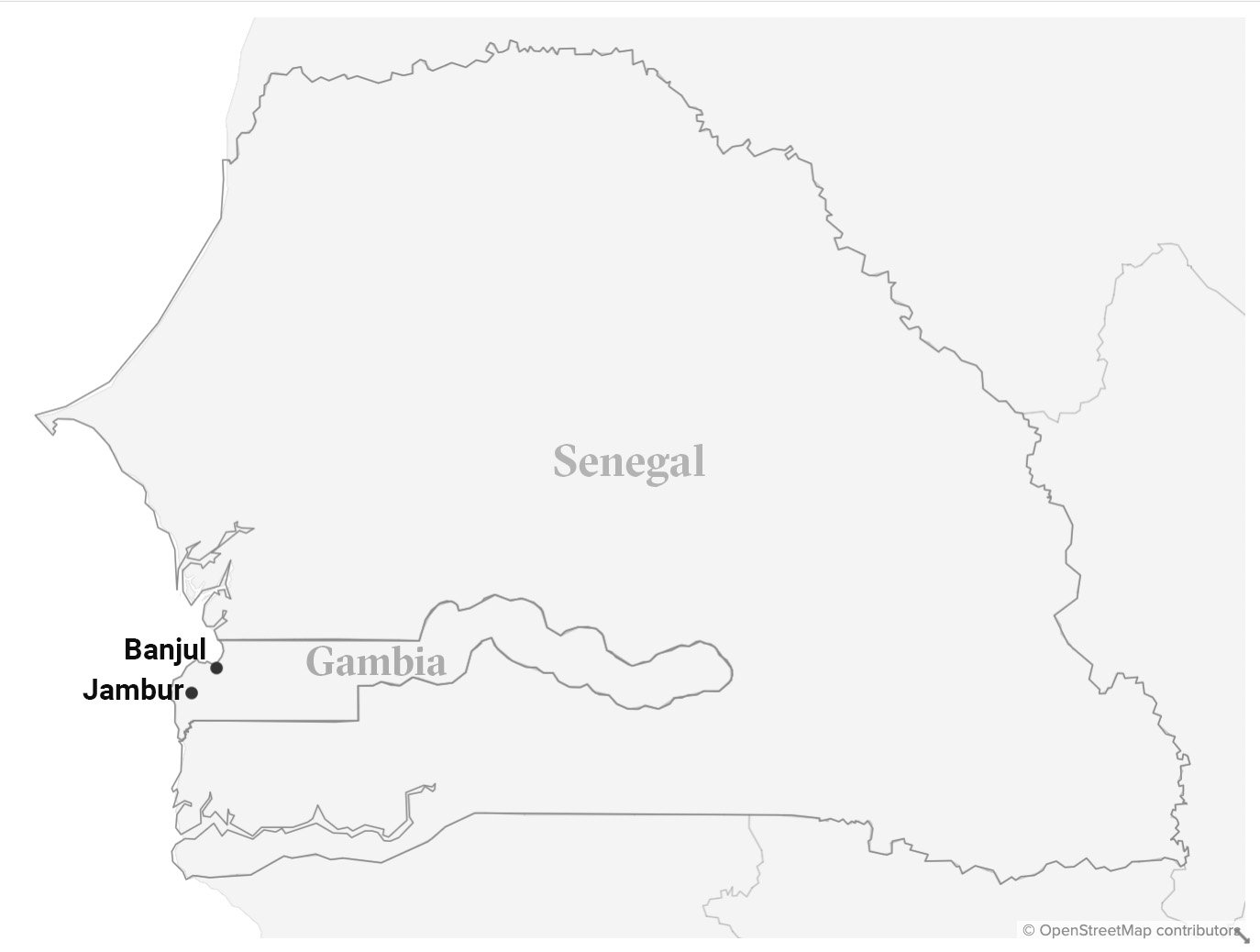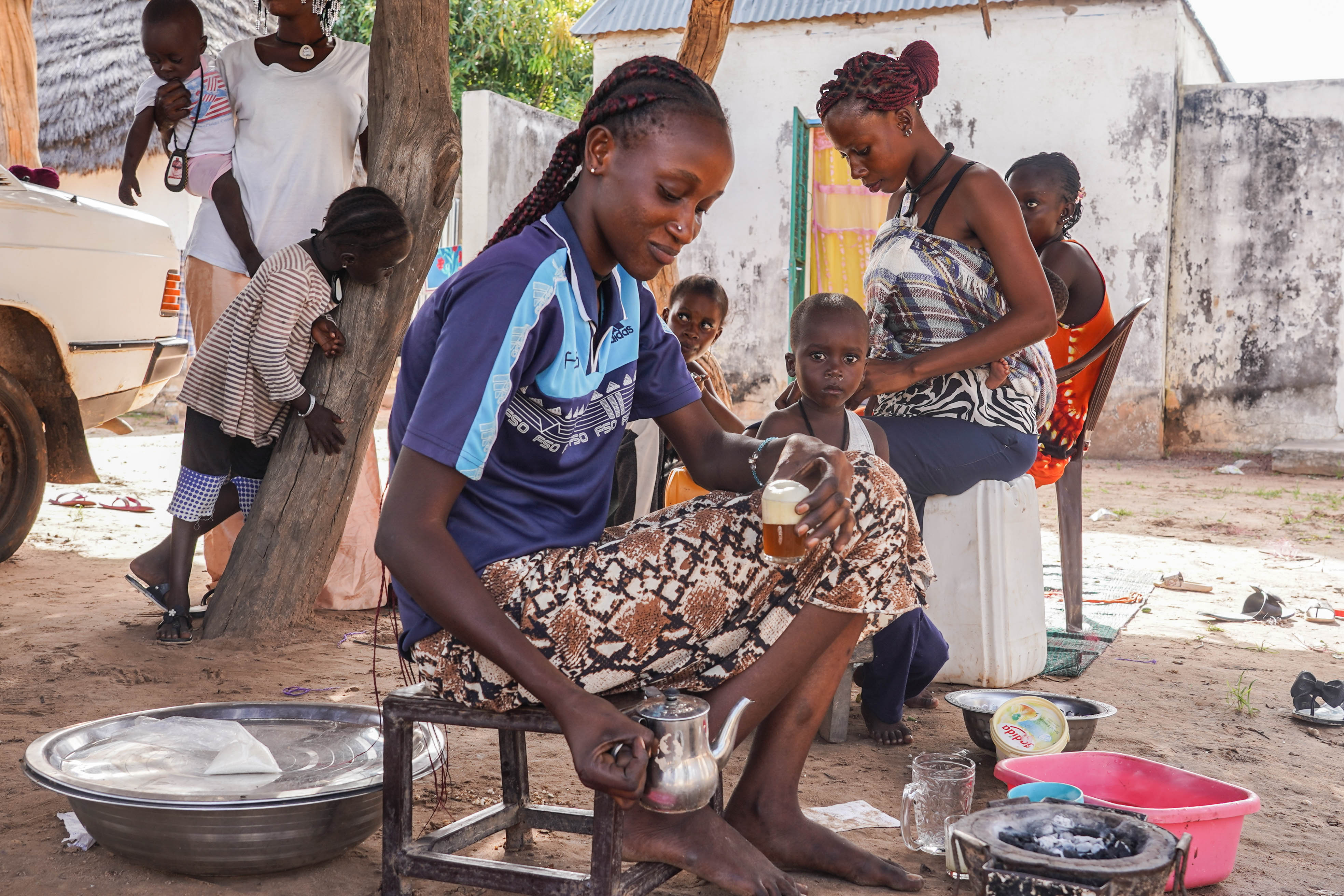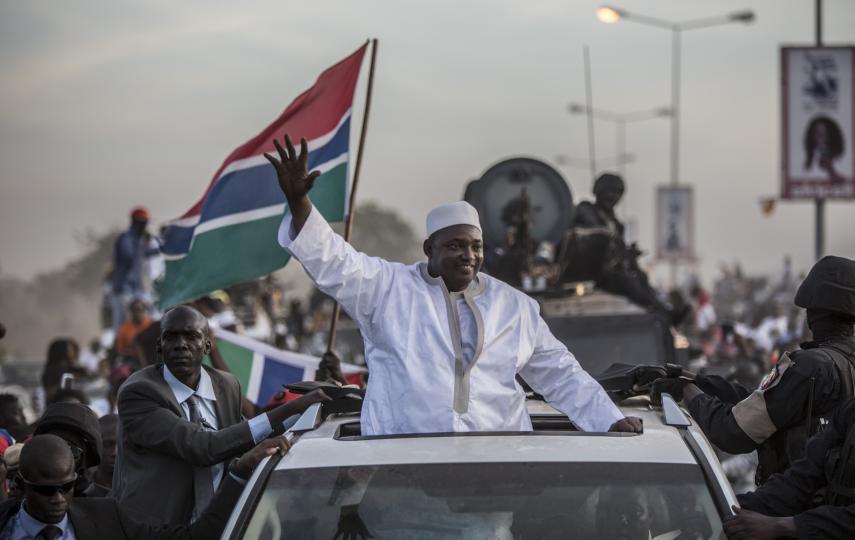Last May, the Gambia’s government vowed to implement the recommendations of a reconciliation commission set up to address human rights abuses committed by the regime of dictatorial former president Yahya Jammeh.
For victims of Jammeh’s 22-year reign, and many other Gambians, it was a major milestone. Yet as the year draws to a close, victims’ associations are concerned the government is stalling on key recommendations and putting politics ahead of justice.
Many Gambians who are owed reparations – including those forcibly exiled or targeted in “witch-hunts” – remain empty handed, while the presence of Jammeh allies in the government of President Adama Barrow has dampened hopes for criminal accountability.
“It is an insult to the Gambian people, a slap in the face of every Gambian,” said Fatoumata Jallow Tambajang, Barrow’s former vice president and a prominent opposition activist during the Jammeh era, which lasted from 1994 to 2017.
Jammeh was forced out of power by a West African military intervention after refusing to accept electoral defeat to Barrow in 2016. The Truth, Reconciliation, and Reparations Commission (TRRC) was launched in 2018 and commenced a series of gripping but painful public hearings the following year.

A final report detailing grim abuses was made public in late 2021, and the government then accepted almost all of the TRRC’s 265 recommendations – from bringing Jammeh and his associates to justice, to offering financial reparations to victims.
Kimbeng Tah, a justice ministry official, rejected claims that the reconciliation process is moving too slowly. He said the government is figuring out the right legal framework for prosecutions, and added that victims who haven’t been compensated will be next year.
“There is an urgency, but if we bow to pressure and rush things, we might not do things perfectly,” said Tah, who is the deputy director of the ministry’s department of civil litigation and international law.
Enduring stigma
Still, faith in the government’s ability to implement the commission's recommendations was wearing thin among victims, civil society groups, and local analysts who spoke to The New Humanitarian in October in different towns and villages.
Trust was especially low in the small western town of Jambur. Residents there said they have not received reparations and medical bill payments despite suffering badly under Jammeh – who is now in exile in autocratic Equatorial Guinea.
In 2008, after Jammeh blamed the death of his aunt on witchcraft, he ordered a “witch-hunt” in Jambur. Residents were made to drink a toxic potion and 20 died during the episode, which Jammeh used to target opposition members and personal enemies.

Over a decade later, the TRRC set up camp on a wide, sandy field in front of Jambur’s central mosque. Victims came forward and provided the commission with accounts of the violence, and described the stigma, health issues, and economic harm they have since suffered.
But the camp has now been dismantled and Jambur residents feel their truth-telling hasn’t translated into anything concrete. Youth left in droves during the Jammeh era – some to the capital, Banjul, others to Europe – and few have returned.
“We, the youth, are finding it very difficult,” said Ousman Bojang, the treasurer of a local youth and development group. “The stigma attached to our elders has a lot of effect on us. When you introduce yourself as being from Jambur, people target you as a witch.”
“We hope that the government will come and empower [youth], creating incentives so they can make a small earning.”
Bojang told The New Humanitarian that his group is organising dialogues for reconciliation purposes. But he said these efforts are not well funded and haven’t helped combat the growing distrust local youth have in authorities.
“We hope that the government will come and empower [youth], creating incentives so they can make a small earning.” said Bojang, as a call to prayer resonated through sand-blown alleys. “But for now we have not seen any of this happen.”
Reparations and new victims
There has been some progress on reparations. A fund set up by the TRRC in 2019 disbursed money for urgent cases. And a bill calling for an independent body to control reparation payments is currently under consideration, according to media reports.
Still, out of the 205 million Gambian dalasis (roughly $3.3 million) requested from the government by the TRRC, just 50 million (around $800,000) has been disbursed to date.
Given that some victims have not yet come forward due to fear and social stigma, more funds may need to be requested. Survivors of gender-based violence are especially reluctant to testify and register for reparations, though local groups say they are combatting this.
“Even in 2022, you still have the men making those decisions for women and about women.”
“We conduct regional outreach activities across the country to encourage them to come forward to document their cases,” said Sheriff Kijera of the Gambia Centre for Victims of Human Rights Violations. “Even last week, we had new victims who came to register.”
Priscilla Yagu Ciesay, head of WAVE, a local NGO that helps women who suffered violence during the Jammeh era, said men often decide if women should request reparations, and choose how women should use the money if they do take it.
“Even in 2022, you still have the men [making] those decisions for women [and] about women, being the spokesperson, not letting women breathe, and talk, and share,” Ciesay told The New Humanitarian.
Jobs for Jammeh loyalists
A former lieutenant, Jammeh took power in a coup and began abusing people soon after. Dissenters were murdered; sham treatments were imposed on people with HIV; migrants were killed; and the dictator is accused of rape and sexual assault.
The TRRC documented at least 240 deaths by the regime, and there have already been consequences: Sentences have been handed down in the Gambia and there are investigations and trials ongoing abroad under the principle of universal jurisdiction.
“This whole idea of reconciliation within our context is so convoluted; it means different things to different people.”
Last month, Gambia’s justice minister, Dawda Jallow, said the government would “definitely” seek Jammeh’s extradition. Jallow said this will happen once a hybrid court is established with the help of the Economic Community of West African States.
Still, some Gambians doubt the government will follow through on this given that Barrow – hailed as a hero in 2016 – has entered a political pact with a faction of Jammeh’s party, the Alliance for Patriotic Reorientation and Construction (APRC).
Though the government accepted almost all of the TRRC recommendations, it controversially rejected a call to bar Ousman Sowe – Jammeh’s former intelligence chief – from holding public office for a decade.
The commission accused Sowe of evidence tampering, but the government argued that because the incident occurred in May 2017, it lay outside the mandate of the TRRC, which covered July 1994 to January 2017.
Meanwhile, other individuals supposed to have been barred from holding public office – either for life or a set number of years – were instead put on administrative leave or continued their work, according to media reports.
Kimbeng Tah, the justice ministry official said: “We wrote to all government agencies and provided them with a comprehensive list [of] people recommended for prosecution or recommended to be banned, and I can assure you they have all been suspended,” he said.
“They are playing on the minds of the people,” Jaw said. “This whole idea of reconciliation within our context is so convoluted; it means different things to different people.”
The shock of seeing former Jammeh allies in positions of power “re-traumatised” some survivors, said Tida Baba Jobe, the wife of a former Jammeh associate who came to be seen as a threat by the dictator and was executed more than a decade ago.
“My children are still not going to school, and those perpetrators are still moving around – that is the worst trauma,” she told The New Humanitarian, explaining that her family has struggled financially and psychologically since her husband’s death.
Community tensions
Reconciliation isn’t only complicated by national politicians. The Jammeh era also led to polarisation between local communities that has been left unaddressed for many years.
The commission’s recommendations include establishing peace committees and setting up local dialogues. But resources for these mechanisms have been slow to arrive, and the processes that have commenced suggest conflicts will be hard to resolve.
One example can be found in the plight of the Ndigal, a religious sect from the village of Kerr Mot Ali, in central Gambia. They fled to Senegal in 2009 after police and paramilitary officers arrested, beat, and raped dozens of community members.
The Ndigal sect follow a religious leader who lives within their community and dictates their religious practices. They identify as believers of Islam but face hostility from other communities.
The TRRC report argues that the forced displacement of the Ndigal is contrary to international human rights law, and calls for the group to be allowed to return home.
Over the past two months, a few Ndigal students have returned to the Gambia to start primary school. Eleven-year-old Ramatoulaye told The New Humanitarian she was glad to be one of them, though she said she is the oldest in her class.
Ramatoulaye’s mother – Kumba Secka – said she was grateful for improved security: “After so many years, I’m less restricted in my mobility. I can have access to healthcare and education. None of my children were going to school, which was a concern.”
Secka lost her father – the former village chief of Kerr Mot Ali – in 2009, after paramilitary officers repeatedly kicked him in the face. On the same day, she was also beaten, and still suffers from pain.
“When we came here, we brought nothing,” she said in an interview from Kerr Mot Ali Senegal, which is just a few hundred metres away from Kerr Mot Ali Gambia. “We didn’t have a mattress to lie on. For three days, all we ate were ground nuts.”
Over 20 Ndigal women were sexually assaulted during the events of 2009, according to WAVE, the local NGO. However, women were told by male community leaders not to mention the abuse during the TRRC investigations.
During recent peace talks attended by officials from the government and the national human rights commission, members of the Ndigal group met residents from several Gambian towns that had previously been hostile towards them.
The talks had partial success: Some Ndigal children returned to the Gambia for school, and women have since given birth in Gambian hospitals. But reparations remain outstanding and tensions persist between the Ndigal and Kerr Mot Ali’s current inhabitants, who were not involved in the initial dialogue.

Some Kerr Mot Ali residents have taken the land of Ndigal followers and have incited hate speech. For example, during a TRRC witness account in 2020, one community leader reportedly said Ndigal followers should be killed or declared unwelcome.
Still, despite these challenges, Ndigal followers told The New Humanitarian they are holding out for reparations and justice. “I’m a Gambian citizen. That’s where I was born and raised. That’s home to me,” said community member Oumi Jaw.
‘Joking relationships’ and a platform to talk
To avoid future conflict, Gambians need a platform to talk and forgive one another, said Yusupha Bojang, a programme manager at the National Council for Civic Education, a citizen engagement body that promotes awareness of the country’s constitution.
Bojang said his organisation will soon start promoting the use of traditional conflict-resolution methods, including so-called joking relationships – customary ties that link groups together and have been shown to be effective in peacebuilding.
“I’m a Gambian citizen. That’s where I was born and raised. That’s home to me.”
But Jaw, the political science lecturer, said community reconciliation processes will only go so far in addressing the long legacy of state violence and bad governance under Jammeh’s regime.
“The violence we experienced was state-perpetrated,” Jaw said. “The way the state can reconcile with the public is by ensuring that there is a greater trust, greater participation [in] democratic process, and public service delivery.”
Edited by: Philip Kleinfeld.






